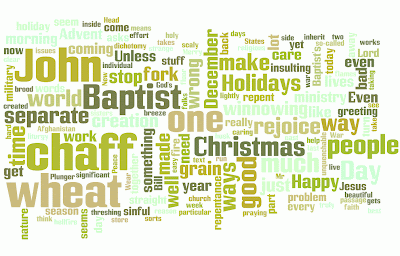
...the Twelve Days of Christmas.
Which before it became an insanely long Christmas Carol with a great rousing cheer in the middle (FIVE GOLDEN RINGS!), was actually a liturgical season.
The Twelve Days of Christmas are in fact the dozen days that separate Christmas Day from Epiphany; that is the 12 days that bridge the gap between our celebration of the birth of Christ and the arrival of the Magi from the East. Or for those who are calendar people, the Twelve Days of Christmas run from December 25 to January 6. It is a time of celebrating!
In fact, in the Middle Ages the Twelve Days of Christmas was a period of continuous feasting and merrymaking which climaxed not on Christmas Day, but on the very last of the nights. Thus the setting for one of William Shakespeare’s most famous plays, “Twelfth Night.”
Our pilgrim forbearers actually brought Christmastide celebrations over to this land from Europe, but with the growing secularization of Christmas, commercialization of “After-Christmas” sales, and general revelry of New Year’s Eve, the Twelve Days of Christmas has faded to the background or disappeared altogether...
...well, except in our worship life!
For these two Sundays of the Twelve Days of Christmas we’ll celebrate the birth of Christ with just as much joy and merriment as we did at our Christmas Eve Service. We’ll recount the stories, sing the Christmas Carols, and continue to spread the good news of Christ’s birth.
Because the true lesson of the Twelve Days of Christmas is that the joy of Christ’s birth in our world and in our hearts is simply too big to be confined to single celebration!
Yours in the journey, Rev. Brian
 On the First Sunday after Christmas we had a Sing-A-Long! Everyone named off their favorite Christmas Carols and we sang them together. It was great! Big thanks to our organist Jerry Jensen for playing us through such a merry worship service. Instead of a full sermon, I simply offered a very brief homily on the joy and value of singing.
On the First Sunday after Christmas we had a Sing-A-Long! Everyone named off their favorite Christmas Carols and we sang them together. It was great! Big thanks to our organist Jerry Jensen for playing us through such a merry worship service. Instead of a full sermon, I simply offered a very brief homily on the joy and value of singing.









